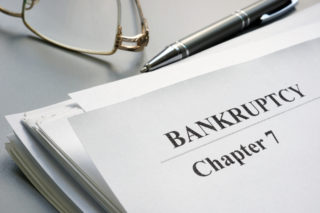 Chapter 13 bankruptcy provides relief only to individuals with regular income. This Chapter is most frequently used by debtors who have sufficient disposable monthly income to make some payments over time to their creditors. Chapter 13 debtors frequently have enough equity in their residence that, if they were to file for Chapter 7, the residence
Chapter 13 bankruptcy provides relief only to individuals with regular income. This Chapter is most frequently used by debtors who have sufficient disposable monthly income to make some payments over time to their creditors. Chapter 13 debtors frequently have enough equity in their residence that, if they were to file for Chapter 7, the residence
Small Business Lending
Bradley’s Bankruptcy Basics: Chapter 11 Bankruptcy — Reorganization
 Chapter 11 bankruptcy cases are most frequently filed by businesses. However, certain high-earning individuals whose debts are above the statutory debt limits to qualify for Chapter 13 can also file for Chapter 11 relief. In Chapter 11 cases, the debtor retains control of its operations as a debtor in possession (DIP) and has the benefits…
Chapter 11 bankruptcy cases are most frequently filed by businesses. However, certain high-earning individuals whose debts are above the statutory debt limits to qualify for Chapter 13 can also file for Chapter 11 relief. In Chapter 11 cases, the debtor retains control of its operations as a debtor in possession (DIP) and has the benefits…
Bradley’s Bankruptcy Basics: Chapter 7 Bankruptcy — Liquidation
 Chapter 7 bankruptcy cases are straight liquidations sought by debtors who wish to have most or all of their debts discharged. In Chapter 7 cases, the Chapter 7 trustee obtains control over the debtor’s assets and evaluates whether any equity exists that would offset the costs of selling those assets. If the bankruptcy estate will…
Chapter 7 bankruptcy cases are straight liquidations sought by debtors who wish to have most or all of their debts discharged. In Chapter 7 cases, the Chapter 7 trustee obtains control over the debtor’s assets and evaluates whether any equity exists that would offset the costs of selling those assets. If the bankruptcy estate will…
Bradley’s Bankruptcy Basics: The 6 Key “Players” in Bankruptcy Cases
 Bankruptcy cases differ from typical lawsuits in a variety of ways, including the parties involved. Whereas standard lawsuits generally involve a plaintiff and a defendant, bankruptcy cases have a different cast of “players,” including the debtor or debtor in possession, creditors, the bankruptcy trustee (i.e., Chapter 7 trustee, Chapter 13 trustee, etc.), committees, and the…
Bankruptcy cases differ from typical lawsuits in a variety of ways, including the parties involved. Whereas standard lawsuits generally involve a plaintiff and a defendant, bankruptcy cases have a different cast of “players,” including the debtor or debtor in possession, creditors, the bankruptcy trustee (i.e., Chapter 7 trustee, Chapter 13 trustee, etc.), committees, and the…
Acting CFPB Director Uejio Reiterates Commitment to Issuing Regulations Enacting Dodd-Frank 1071
 On February 4, 2021, acting CFPB Director Dave Uejio published a blog post sharing statements recently made to the staff of the CFPB’s Division of Research, Markets, and Regulations (RMR). In his post, Uejio stressed two policy priorities for the CFPB: “(1) relief for consumers facing hardship due to COVID-19 and the related economic crisis…
On February 4, 2021, acting CFPB Director Dave Uejio published a blog post sharing statements recently made to the staff of the CFPB’s Division of Research, Markets, and Regulations (RMR). In his post, Uejio stressed two policy priorities for the CFPB: “(1) relief for consumers facing hardship due to COVID-19 and the related economic crisis…
Bradley’s Bankruptcy Basics: A Multimedia Series
 Bankruptcy. The arrival of that notice stating a customer has filed for bankruptcy can evoke less-than-ideal responses: forwarding the notice to someone else who might know what to do with it (resulting in the notice ending up in a forever loop of being forwarded along); immediately writing off the account and cutting your losses; or,…
Bankruptcy. The arrival of that notice stating a customer has filed for bankruptcy can evoke less-than-ideal responses: forwarding the notice to someone else who might know what to do with it (resulting in the notice ending up in a forever loop of being forwarded along); immediately writing off the account and cutting your losses; or,…
CFPB Releases Observations of COVID-19 Impacts to Small Business Lending through PPP Loans and Potential Fair Lending Risks
 As we recently noted, the CFPB released the 23rd issue of its Supervisory Highlights report, focusing on COVID-19 prioritized assessments. In the report, the CFPB identified small business lending as an area that poses a risk of consumer harm. In particular, the CFPB focuses its discussion of small business lending on the Paycheck…
As we recently noted, the CFPB released the 23rd issue of its Supervisory Highlights report, focusing on COVID-19 prioritized assessments. In the report, the CFPB identified small business lending as an area that poses a risk of consumer harm. In particular, the CFPB focuses its discussion of small business lending on the Paycheck…
Florida Court Affirms That Merchant Cash Advance Product Not Subject to Usury Statute
 This month, a Florida appellate court held that a merchant cash advance (MCA) purchase and sale agreement was not a “disguised loan” and, therefore, was not subject to Florida’s criminal usury statute. MCA purchase and sale agreements, which offer merchants a fast and efficient way to obtain funding for their operations, are not loans. Rather,…
This month, a Florida appellate court held that a merchant cash advance (MCA) purchase and sale agreement was not a “disguised loan” and, therefore, was not subject to Florida’s criminal usury statute. MCA purchase and sale agreements, which offer merchants a fast and efficient way to obtain funding for their operations, are not loans. Rather,…
New York Enacts Small Business Truth in Lending Disclosure Requirement Affecting Small Business Loans, MCAs, and Other Forms of Business Finance
 A new year brings new compliance requirements for non-banks and fintechs conducting business in New York, including Merchant Cash Advance (MCA) companies. On December 23, 2020, New York Gov. Andrew Cuomo signed SB5470 expanding the New York Financial Services law to require non-banks and fintechs to provide small businesses with lending disclosures similar to those…
A new year brings new compliance requirements for non-banks and fintechs conducting business in New York, including Merchant Cash Advance (MCA) companies. On December 23, 2020, New York Gov. Andrew Cuomo signed SB5470 expanding the New York Financial Services law to require non-banks and fintechs to provide small businesses with lending disclosures similar to those…